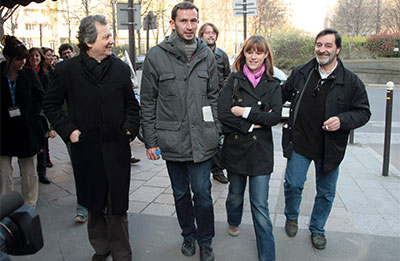“Champagne.” Augustin Scalbert’s tweet on Monday could not have better expressed the joy and relief at Rue89, a leading French news website. After four years of legal procedures, a Paris judge had just announced he was dropping all charges against the journalist “for lack of evidence” in a case that was seen as a litmus test for the independence of the French press in reporting on the presidency.
In June 2008 Scalbert, a renowned reporter and media critic, had posted and wrote about a video showing then-President Nicolas Sarkozy chatting with journalists a few minutes before an on-air interview on the public service channel France 3. The president appeared in a very bad mood, scolding a technician that had refused to salute him, talking condescendingly with one of the journalists, and even suggesting a question to the interviewer.
As the video went viral–it has been seen by more than 4 million people on Daily Motion–the Elysée Palace reacted immediately and with vigor. According to media reports at the time, the France 3 management, against the majority opinion of the channel’s association of reporters and editors, was forced to file a complaint for “theft, receiving stolen goods, and forgery.” In 2009, Scalbert and the director of Rue89, Pierre Haski, were summoned by police and interrogated. In 2010, the Rue89 journalist together with a France 3 technician was eventually indicted for uploading the video and refusing to reveal his source at France 3–a charge that could have carried a five-year prison sentence and a 375,000 euro (US$462,000) fine.
Most observers saw this legal action as an outrageous sign of the French state’s political interference in the public media as well as an attempt to intimidate journalists covering the presidency. On Tuesday Haski, the co-founder of Rue89, did not miss this point in his reaction to the judge’s decision. “It has not taken more than two months after Sarkozy’s departure from the Elysée Palace,” he wrote, “to end a long winding procedure that smacked of political revenge.”
“This outcome is natural for the France 3 technician and myself because this affair was eminently political and constituted an attack against press freedom. I would have preferred that the judiciary prove its independence by issuing its ruling before the change of government,” Scalbert told CPJ. “However as Nicolas Sarkozy had triggered the procedure by his pressures on France 3 the prosecutor waited for François Hollande’s election to declare that there was no ground for prosecution, a decision naturally followed by the juge d’instruction (examining magistrate).”
The decision has been hailed as a victory for freedom of expression. “It is great news not only for the people involved, but also for the right to information on an issue of public interest: the head of state in the exercise of his functions,” Haski wrote.
“All’s well that ends well,” Haski concluded, adding mischievously: “It is also an opportunity to watch again this legendary ‘Sarko off’ video…”
[Reporting from Brussels]
